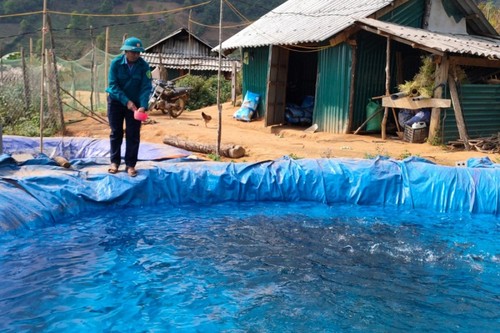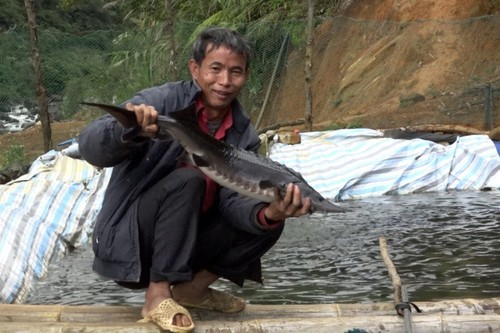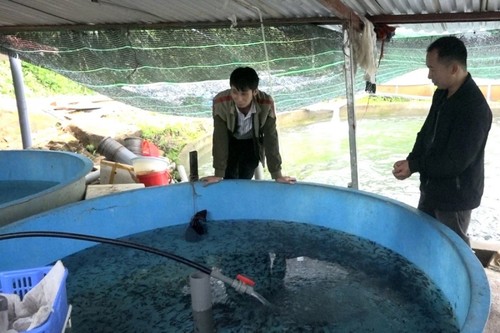 Son Binh commune has 26 cold-water fish farms, with more than 300 tanks. (Photo: VOV) Son Binh commune has 26 cold-water fish farms, with more than 300 tanks. (Photo: VOV) |
Located at the foot of Hoang Lien Mountain, the hamlets of Son Binh commune, Tam Duong district, are surrounded by old forest and have a favorable climate for cold water fish farming, opening up a new direction for local agricultural production.
Chu Va 8 hamlet is home to 200 Mong ethnic households. A local villager named Hàng A Phàng said he began raising sturgeon and salmon about six years ago following a visit to relatives in Sa Pa town.
After a period working for an enterprise engaged in cold-water fish cultivation in Sa Pa, A Phang realized that Nam Thi stream flowing through his hamlet had similar conditions. In 2019 he bought five floating tanks to raise sturgeon. The model has been a great source of income for his family and other villagers.
A Phang recalled that in the past, he didn’t know the techniques of raising cold-water fish, but after going to Sa Pa to learn, he returned home and did the same.
“My family switched to raising cold-water fish and earned more income than doing farm work. Last year we earned more than 38,000 USD from raising 2,500 fish at our old farm. Since we moved to a new farm with a larger area, we’ve increased to 8,000 fish and our income will be higher if everything goes smoothly,” said A Phang.
 Cold-water fish farming is helping many Mong ethnic households escape poverty.(Photo: VOV) Cold-water fish farming is helping many Mong ethnic households escape poverty.(Photo: VOV) |
Nguyen Gia Oanh’s family in Bao Thang district bought more than 1 hectare of land in Chu Va 8 hamlet and has raised cold-water fish since 2019.
On an area of about 6,000 m2, Oanh has built a closed farming process and maintained a large volume of fish to sell to the market regularly. Oanh invested nearly 10,000 USD in each pond and has earned 23,000 USD from selling the fish.
Realizing the profitability, this year Oanh has built seven more ponds to raise between 7,000 and 8,000 fingerlings and hopes to sell 25 to 30 tons of fish per year.
“The water used to raise sturgeon and salmon must be cold and clean. The prices of these fish have been relatively stable for many years,” said Oanh, adding, “Due to its economic growth possibility, my family have decided to raise fish. Each year we can earn between 25,000 and 30,000 USD.”
According to Hoang Dinh Quan, Deputy Chairman of Son Binh commune’s People’s Committee, the Nam Gie and Nam Thi streams flowing through the commune have a dependable cold-water source which is necessary for sturgeon and salmon to survive.
 Many local households produce fingerlings for the market. (Photo: VOV) Many local households produce fingerlings for the market. (Photo: VOV) |
Taking advantage of this, businesses and individuals have invested in 26 cold-water fish farming establishments, with more than 300 tanks, mainly in Chu Va 12 and Chu Va 8 hamlet.
With an average selling price of 8.5 to 11 USD a kilo, Son Binh commune has earned between 700,000 and 750,000 USD a year from fish farming, said Quan.
He noted, “Previously, only a few businesses and cooperatives invested and exploited the potential and strengths of the commune. Now even a few Mong villagers in Chu Va 8 and Chu Va 12 have invested in raising sturgeon and salmon.” Thanks to advanced technology and making full use of local conditions, many Mong ethnic people have become rich, according to Quan.
Due to the restructuring of crops and livestock, especially cold-water fish farming, the average annual income in Son Binh commune is now 1,800 USD. Cold-water fish farming could help the commune reach its new-style rural area goals this year.